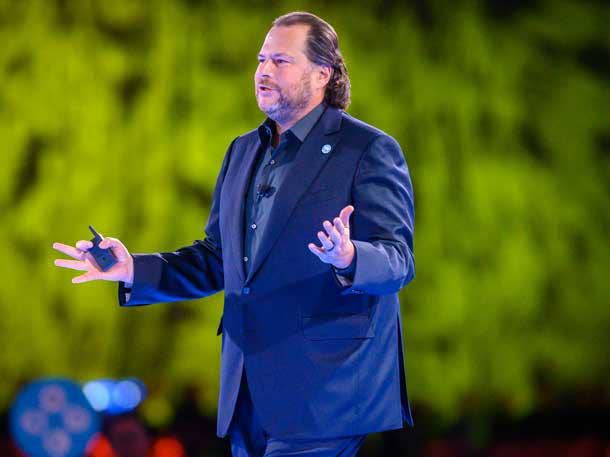Salesforce Surges Amid Coronavirus Crisis
The CRM leader transformed to meet the demands of the pandemic, and delivered a major beat on revenue and earnings with its best-ever operating margins. ‘We know what role we play in our industry. We know that we are a light and we have to continue to be that light, especially during these difficult times,’ CEO Marc Benioff says.

Amid the coronavirus crisis, Salesforce notched one of the best quarters in the company’s history, and predicted a bright, if still highly uncertain, year to come.
In earnings released Tuesday, the CRM giant raised guidance after notching impressive sales that for the first time crossed the $5 billion quarterly threshold thanks to 29 percent growth in Q2 of fiscal 2021.
That financial success amid difficult times is testament to Salesforce entirely transforming its business operations and strategy to meet the unprecedented demands of the moment, CEO Marc Benioff told investors.
[Related: Salesforce Extends WFH, Childcare Benefits]
When Salesforce started the quarter with 54,000 remote employees working from home, the company’s leaders decided it was going to be critical to “reshape our company,” Benioff said.
Product roadmaps and investment plans changed, as did operational values, to meet the rapidly evolving needs of its customers and help a broader set of stakeholders mitigate the crisis.
“We know what role we play in our industry. We know that we are a light and we have to continue to be that light, especially during these difficult times,” Benioff said.
The shift paid off with $5.15 billion in revenue for the quarter ended July 31, compared to the $4.9 billion that analysts predicted. Earnings-per-share of $1.44 beat expectations of 67 cents, and Salesforce achieved its highest operating margins.
Salesforce stock, which next month will be added to the Dow Jones index, surged in after-hours trading from a market close of $216.05 to $244.20 at the time of this publication.
Benioff said he’s now seen three or four major crises as CEO of the company, and while each has been different, one commonality is “each one has been an accelerator in the future,” he said.
“Each crisis seems to bring us to the future faster,” Benioff told investors.
That’s proving especially true with COVID-19.
“This has changed us. The pandemic has changed us,” he said.
Benioff cited as an example a weekly all-hands call with the company’s 54,000 employees—something Salesforce last did when it was a 10-person startup.
Despite strong financials and upgraded guidance, he knows the future is uncertain when “dealing with a virus that has a lot of unusual characteristics.”
“We’re reimagining our business. Also we’ve had to reimagine our relevance,” Benioff said.
That effort has involved building Work.com, a platform that has enabled companies to bring employees back to work safely by implementing contact tracing, shift scheduling, and workforce command centers.
Benioff also remarked on his sadness in having to cancel an in-person Dreamforce conference.
“There is no Dreamforce in 2020,” he said. “We’re not all headed to San Francisco next month. Metallica is not playing.”
Benioff didn’t say whether the event would be held in a virtual format this year, or when he thought the world-largest tech conference could resume.
“Will we all be back together again? I hope so. Am I sure? I really don’t know,” he said. “We’re grieving that … There’s a sadness we’re not all going to be together.”
Much of the Salesforce’s Q2 prowess was fueled by more than 60 percent growth in Tableau, a $15.7 billion acquisition which Benioff said he thinks will prove the most successful the company has ever made.
But that might be the last big deal Salesforce strikes for a while, he added.
“We’re not in a good M&A environment,” Benioff told investors, adding in the present market, the math wouldn’t work to even be able to buy formerly publicly traded companies like Tableau, or MuleSoft, which Salesforce purchased in 2018 for $6.5 billion.
Salesforce is happy it struck those two big deals, but now must look inward and focus on execution, he said.